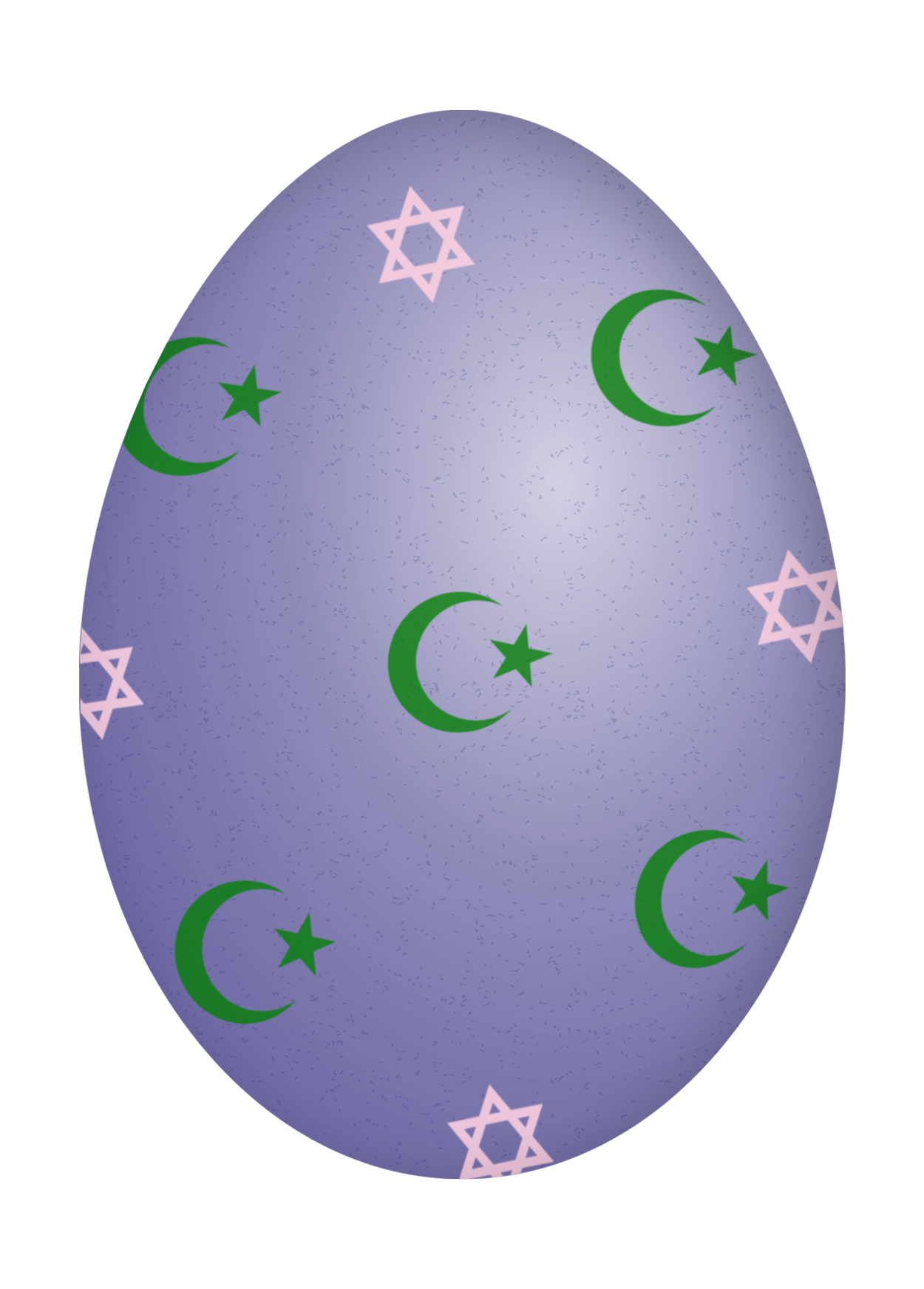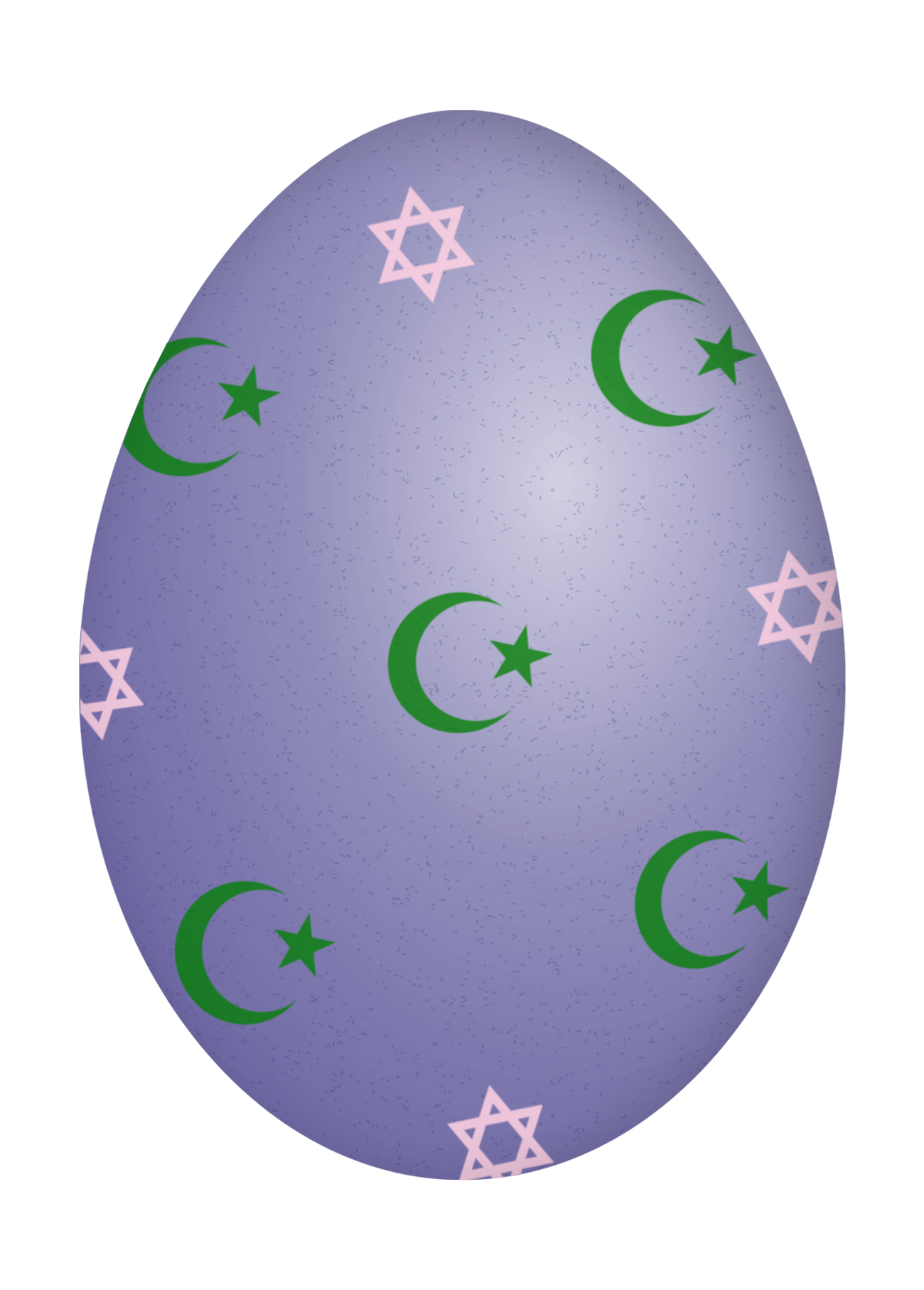A Celebration of Overlapping Faiths
This year, our family will mark Passover, Easter, and Ramadan at the same time—and honor the three religions that contributed to my children’s heritage




Many people want to know if my two children, born to a Jewish mother and a Muslim father, are Jewish or Muslim. Recently, at a Parisian café on a central boulevard lined with perfect Juliet balconies, a young professor asked me the question that repeats, like a scratched CD, throughout my adult life: “Which one did you choose for your children?” When I answered “both,” that our two children are Jewish and Muslim, she shook her head in disbelief and laughed out loud, asking: “What does that make them—nothing?”
This year, as last year, we will host a Passover Seder in Italy on Easter that is also an iftar (the daily fast break during Ramadan). This is because Ramadan began on March 22 at sundown and continues until April 21, Passover begins on April 5 at sundown and continues until April 13, and Easter falls on April 9. We will celebrate all three holidays together, since all three religions are part of our family’s story.
Last year, my sister and I aligned our five children’s school breaks to meet in Bologna, her middle child an Italian history buff longing to see garden sculptures and frescoes. We only later realized that we would be gathering for Passover, which would also be Ramadan, and coincide with Easter. This is now becoming a kind of unexpected family tradition.
Of course, these holidays rarely align. Next year, they will be dispersed throughout spring. Yet when it happens, the intersection of Abrahamic celebrations seems entirely appropriate for us. We are, after all, the daughters of a Jewish mother and a Christian father. We grew up with a menorah glowing beside a Christmas tree, annual Easter eggs hunts and searches for the afikoman.
Growing up with a Jewish mother on the Upper West Side meant growing up with the belief that—like my parents—half the world was Jewish, too. There, bookstores carried titles about Rosh Hashanah and Hanukkah, delis served pastrami on Jewish rye, and nothing was more beloved to Jews and non-Jews alike than the New York City bagel. Yet it also entailed growing up with a deep awareness of suffering, many of our neighbors having fled Europe during the Nazi era, some having survived concentration camps. Stories of this suffering were told to us by our mother and our grandmother. Images of this suffering marked the books in our school libraries and our neighbors’ skin. And although we had never crossed the Atlantic, Europe remained the terrifying backdrop of this suffering: Germany, in particular, a taboo land that haunted us, as it did our elders, across the wide divide of the seas.
Curiosity about that land led me to study the German language in college, and eventually down a path in which I, a sociologist, rooted my research, my writing, and my own family in Germany. I have lived in Germany on and off for nearly 20 years, as an academic researching Jews and Muslims in post-WWII Europe, exposing the marginality that both groups face, but also their agency in contesting exclusions: their place, our place as not only citizens, but also creators of European societies.
I have not only resettled my life in this once-taboo land, but since found a home in the overlaps of Jewish and Muslim life by both embracing my own Jewish identity and marrying a Turkish German Berliner.
Raising children in a Jewish-Muslim household means that we—my husband of a decade, myself, and our two children—reside in the intersections of our traditions. In spite of the desperate pleas of my mother-in-law that I convert to Islam before we married, and the stern assertion of my own mother that my children are undeniably Jewish by maternal lineage, neither of us relinquished our religions.
Being in Italy with my family for Passover, Ramadan, and Easter is a way to actively celebrate the points of unity, such as the notion of overcoming, in all three of the traditions that have shaped my family’s life. On Passover, we remember those who fled Egypt, overcoming persecution through liberty found across the opened seas. Easter celebrates the resurrection of Jesus, which similarly symbolizes the hope of overcoming great suffering and loss. Ramadan is a period of spiritual rejuvenation through the overcoming of daily desires. The coming together of these Jewish, Christian, and Muslim holidays creates a moment of aligned devotion, and also the hope that in overcoming, we will create a better world.
We all know that such hope matters, not least of all today here in Europe, where war has ravaged Ukraine, with millions of refugees fleeing across the borders to Poland and then Germany. We have seen the images of children buried under rubble, orphans who arrive at our train stations without their parents, without even a language to share their pain with us. We have witnessed this up close, with a Ukrainian boy named Alex among my 8-year-old son Sami’s closest friends. I wonder when he asks me if Alex’s family will die, what else we can give to him other than a shared sense of hope and togetherness, across our languages and our religious traditions. That they, that we may overcome great hardship, as we learned from our Jewish forbears in Egypt, from the Christian story of Jesus’ sacrifice, and from the act of fasting for 30 days on Ramadan.
There is, of course, more to our life than harmonious intersections. But I have also learned from our traditions that overcoming does not entail resolution. It entails a great many questions and creative answers: finding a way forward, beyond the challenges we all encounter on our paths. Since I gave birth to our first child, we have had skirmishes over how to celebrate my father and his Christian traditions (settling on socks filled with candy) on Christmas. We have had a naming ceremony for our children in a synagogue, giving Sami the Jewish name “Noah,” my very favorite name, which I relinquished when my mother-in-law struggled to pronounce it; I similarly refused my husband’s favorite name, Yusuf, from his most beloved Quranic story, for our son.
We are far from the first to walk this path. My own parents had an interreligious marriage. And so, too, did the Prophet Muhammad, who had a Jewish wife.
Still, nothing prepared my husband and me for the questions about who we are and who we, together, could be. What would marrying one another mean for our religious and cultural identities? What would the household of a traditional, practicing Turkish German Muslim man and a liberal Jewish New Yorker look like? What would we lose in gaining one another? And perhaps, most importantly, when we had children, what would we choose for them?
We did not choose for them. Instead we chose them as they are, born pink, plump, and perfect: grown in a household that is very Jewish and very Muslim, very American and very Turkish, somehow, and somewhat German, too.
Today, my 8-year-old son Sami takes pride in being American, Turkish, and German. He sees himself as both Muslim and Jewish, and close to Christianity through my late father, whom he never met but knows through my stories as a kind and gentle man. Sami is at home in the synagogue, where he learned to light Shabbat candles and make challah of his own. He is at home in a mosque, where he watches his father pray on turquoise carpets that remind him of the sea. And he is certain that Santa Claus does not discriminate against Jewish and/or Muslim children in his gift-giving (Santa is from Turkey, after all).
Sometimes, at home, Sami asks me to recite a verse from the Torah before he sleeps, as a protective and calming salve that accompanies him from wakefulness to that otherworld of dreams. “Can you tell me the Jewish Quran?” he asks.
Sometimes, when I am asked which religion we have chosen for our children, I describe this request: the understanding, the words, the question that forges new paths. The very existence of our children remakes our world as I imagine God meant for it to be made, where we do not dwell in the places that divide us, but where we overcome them so that we may come to know, may come to love one another as both different and the same.
We have done the best we can to make this world not only bearable, but beautiful for our children, with Jewishness and Muslimness not only familiar, but an unwavering home for them and also, with them, an unwavering home—built by Noah and Yusuf, so many other prophets, so many surviving texts—for ourselves. Their both-ness has given us a shelter from the questions, the audacity of those who call my children, who are my everything, nothing, those small and painful daily storms.
And they, our children, have already made me, as a Jew, far more whole: connecting with my traditions, from the baking of hamantaschen to the recitation of Torah, in order to pass them on. They are the reasons that I joined a synagogue for the first time, and why I have crafted a life in Germany centered on the redemption of Jewish life.
On Passover, we conclude with the words “next year, in Jerusalem,” to describe longing for the Jewish homeland. Today’s Jerusalem is a place of conflict, but also one imbued with the cultures, the heritage, and the hopes of all three Abrahamic religions, together and apart. This year in Italy, we will celebrate Passover with an iftar on Easter, with the Four Questions of the youngest child, who will now be Sami, reading the Haggadah for the first time. My husband will break his fast not with bread but with matzo.
This day will be one of the only days on which we are not asked to choose: a day on which I, a Jewish mother, can celebrate with my Muslim husband, while remembering my Christian father. And if I hold this moment close, perhaps it will give me strength, so that the next time someone asks what we have chosen for our children, I can confront their uncertainty with stories of this Passover, this iftar on Easter in Italy. I may tell them that our Jewish-Muslim children are living, breathing proof that we are not all the same, but that we spring from the very same source. But I will also warn them that this does not make them nothing. Nor are we, my family, everything. We are simply at home in the intersections and overlaps of our traditions, not in-between, but knee-deep in the plurality that makes our world beautiful and also whole.
There is so much that we, in this simple togetherness, have and can overcome.
Elisabeth Becker is a sociologist, currently the Freigeist Fellow at Heidelberg University.